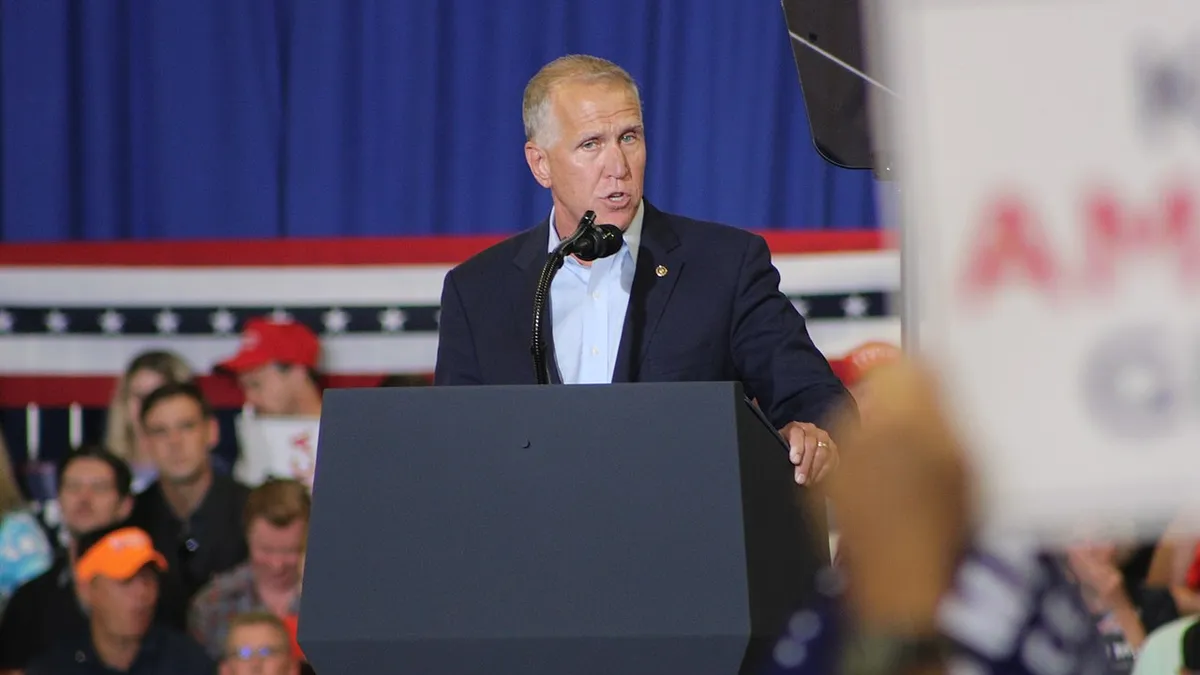Dive Brief:
-
Seven Republican senators on Thursday sent a letter to Senate Majority Leader Mitch McConnell, R-Ky., urging him to consider policies in future COVID-19 relief and recovery proposals that will bolster the clean energy sector.
-
The letter was led by Sen. Thom Tillis, R-N.C., and included support from Senate Energy and Natural Resources (ENR) Chair Lisa Murkowski, R-Alaska, Sens. Lindsey Graham, R-S.C., Susan Collins, R-Maine, and others. It calls for McConnell to consider policies that would boost "jobs and innovation" within the renewables, carbon capture, nuclear, energy efficiency, transportation and storage sectors, making the case that it is "fiscally prudent" to do so.
-
Broad Senate Republican support for clean energy inclusion has thus far been lacking, though Murkowski has been pushing for it. "As with past measures, it appears at this point in time that energy specific measures are largely being left out. But I am hoping we can find common ground in some of these areas," she told an audience of state energy regulators this week.
Dive Insight:
Thursday's letter marks a critical shift in Senate Republican support for clean energy inclusion in an economic recovery package, according to policy observers.
"Today's Senate Republican letter to Leader McConnell reflects the growing bipartisan support for including the clean energy sector and its workforce in the next round of COVID legislation," Gregory Wetstone, president and CEO of the American Council on Renewable Energy, said in an emailed statement. "We commend Senator Tillis and the rest of the letter signatories for making clear that standing up for millions of American clean energy workers is not – and has never been - a partisan issue."
McConnell was critical of previous efforts to include green energy in earlier legislation, accusing Democrats of trying to "dust off the Green New Deal," a sentiment echoed by President Donald Trump in March. Congress as a whole has been working to strike a balance between relief and recovery efforts, prioritizing more urgent relief efforts early on in the pandemic and ensuing economic shutdown, political observers say. But now, several months into relief efforts, some are urging Congress to begin addressing recovery, and with Republican support, that recovery could include clean energy.
"When you're talking about the number of ventilators that are available to ill Americans, it's hard to talk about tax credit for clean energy. So I think there was a timing issue that was off early on," Heather Reams, executive director of conservative clean energy group Citizens for Responsible Energy Solutions, told Utility Dive. As a result, clean energy inclusion "really got a lot of backlash from Republicans, particularly in the Senate."
"I think this is a nice contrast to show that this isn't the Green New Deal. This is business. This is an industry. We are more in a recovery situation than a rescue" even with coronavirus increasing in some states, she said.
Sens. Cory Gardner, R-Colo., Richard Burr, R-N.C., and Martha McSally, R-Ariz., all signed onto the letter as well. Though many of the signers have been active on energy issues in the past, McSally is one notable newcomer to the space, said Reams. Her inclusion is an indication that the growth of solar in Arizona and elsewhere in the country could bring more Republicans onboard.
"This is, I think, the largest number of Republican senators [that have] signed on and said, 'We want to see something,'" she said. "And there are new faces to this as well. So I think we're gonna see more of this."
Murkowski earlier this week expressed some skepticism about getting clean energy in a future package, though she and her colleagues are "actively discussing where we can draw support."
Her policy priorities include extending safe harbor deadlines for renewable energy projects and giving cash grants in place of tax credits to renewables, as well as waiving regulatory fees for "challenged nuclear plants." She also said there are "initial discussions" happening around creating a paycheck protection program for nonprofit utilities, including municipal utilities and electric cooperatives.
"I can't tell you which of these items may make it into a final package, only that, in my view, they make good sense. And I think that they would enhance it," she said. One of her priorities has been trying to pass the comprehensive energy bill she and ENR Ranking Member Joe Manchin, D-W. Va., proposed earlier this year.
The bill was stalled on the floor in March because of a dispute over a hydrofluorocarbon (HFC) bill, and though her office expressed optimism about bringing it to the floor "as early as July," Murkowski indicated negotiations over the HFC bill are ongoing.
"We got stalled out, not because of any issues within our bill, but an unrelated dispute from another committee that we're continuing to work to to unravel," she told an audience virtually at the National Association of Regulatory Utility Commissioners Summer Policy Summit on Tuesday.
"If anybody has an opportunity to raise these issues with folks on the [Environment and Public Works] committee to separate HFCs from our energy bill, I'd appreciate that. We are continuing to weigh in. And we'd like to think we're making some good progress," she said.















